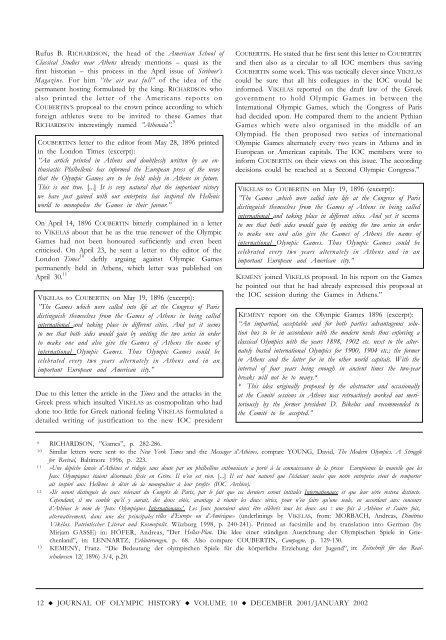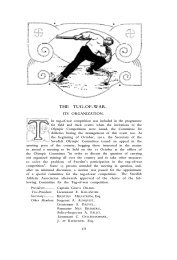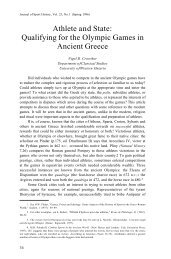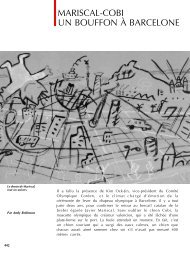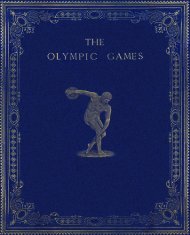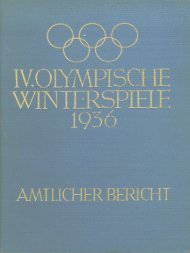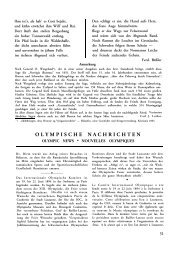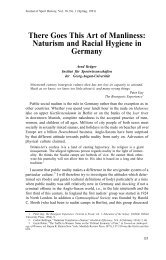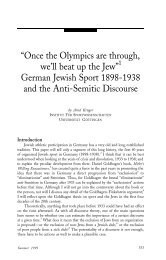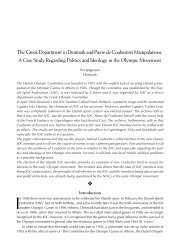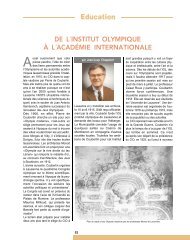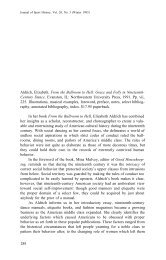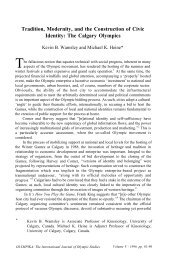The 2nd International Olympic Games in Athens 1906.
The 2nd International Olympic Games in Athens 1906.
The 2nd International Olympic Games in Athens 1906.
You also want an ePaper? Increase the reach of your titles
YUMPU automatically turns print PDFs into web optimized ePapers that Google loves.
Rufus B. RICHARDSON, the head of the American School of<br />
Classical Studies near <strong>Athens</strong> already mentions – quasi as the<br />
first historian – this process <strong>in</strong> the April issue of Scribner’s<br />
Magaz<strong>in</strong>e. For him ”the air was full” of the idea of the<br />
permanent host<strong>in</strong>g formulated by the k<strong>in</strong>g. RICHARDSON who<br />
also pr<strong>in</strong>ted the letter of the Americans reports on<br />
COUBERTIN’S proposal to the crown pr<strong>in</strong>ce accord<strong>in</strong>g to which<br />
foreign athletes were to be <strong>in</strong>vited to these <strong>Games</strong> that<br />
RICHARDSON <strong>in</strong>terest<strong>in</strong>gly named ”Athenaia”. 9<br />
COUBERTIN’S letter to the editor from May 28, 1896 pr<strong>in</strong>ted<br />
<strong>in</strong> the London Times (excerpt):<br />
”An article pr<strong>in</strong>ted <strong>in</strong> <strong>Athens</strong> and doubtlessly written by an enthusiastic<br />
Philhellenic has <strong>in</strong>formed the European press of the news<br />
that the <strong>Olympic</strong> <strong>Games</strong> are to be held solely <strong>in</strong> <strong>Athens</strong> <strong>in</strong> future.<br />
This is not true. [...] It is very natural that the important victory<br />
we have just ga<strong>in</strong>ed with our enterprise has <strong>in</strong>spired the Hellenic<br />
world to monopolise the <strong>Games</strong> <strong>in</strong> their favour.”<br />
On April 14, 1896 COUBERTIN bitterly compla<strong>in</strong>ed <strong>in</strong> a letter<br />
to VIKELAS about that he as the true renewer of the <strong>Olympic</strong><br />
<strong>Games</strong> had not been honoured sufficiently and even been<br />
criticised. On April 23, he sent a letter to the editor of the<br />
London Times 10 deftly argu<strong>in</strong>g aga<strong>in</strong>st <strong>Olympic</strong> <strong>Games</strong><br />
permanently held <strong>in</strong> <strong>Athens</strong>, which letter was published on<br />
April 30. 11<br />
VIKELAs to COUBERTIN on May 19, 1896 (excerpt):<br />
”<strong>The</strong> <strong>Games</strong> which were called <strong>in</strong>to life at the Congress of Paris<br />
dist<strong>in</strong>guish themselves from the <strong>Games</strong> of <strong>Athens</strong> <strong>in</strong> be<strong>in</strong>g called<br />
<strong>in</strong>ternational and tak<strong>in</strong>g place <strong>in</strong> different cities. And yet it seems<br />
to me that both sides would ga<strong>in</strong> by unit<strong>in</strong>g the two series <strong>in</strong> order<br />
to make one and also give the <strong>Games</strong> of <strong>Athens</strong> the name of<br />
<strong>in</strong>ternational <strong>Olympic</strong> <strong>Games</strong>. Thus <strong>Olympic</strong> <strong>Games</strong> could be<br />
celebrated every two years alternately <strong>in</strong> <strong>Athens</strong> and <strong>in</strong> an<br />
important European and American city.”<br />
Due to this letter the article <strong>in</strong> the Times and the attacks <strong>in</strong> the<br />
Greek press which <strong>in</strong>sulted VIKELAS as cosmopolitan who had<br />
done too little for Greek national feel<strong>in</strong>g VIKELAS formulated a<br />
detailed writ<strong>in</strong>g of justification to the new IOC president<br />
COUBERTIN. He stated that he first sent this letter to COUBERTIN<br />
and then also as a circular to all IOC members thus sav<strong>in</strong>g<br />
COUBERTIN some work. This was tactically clever s<strong>in</strong>ce VIKELAS<br />
could be sure that all his colleagues <strong>in</strong> the IOC would be<br />
<strong>in</strong>formed. VIKELAS reported on the draft law of the Greek<br />
government to hold <strong>Olympic</strong> <strong>Games</strong> <strong>in</strong> between the<br />
<strong>International</strong> <strong>Olympic</strong> <strong>Games</strong>, which the Congress of Paris<br />
had decided upon. He compared them to the ancient Pythian<br />
<strong>Games</strong> which were also organised <strong>in</strong> the middle of an<br />
Olympiad. He then proposed two series of <strong>in</strong>ternational<br />
<strong>Olympic</strong> <strong>Games</strong> alternately every two years <strong>in</strong> <strong>Athens</strong> and <strong>in</strong><br />
European or American capitals. <strong>The</strong> IOC members were to<br />
<strong>in</strong>form COUBERTIN on their views on this issue. <strong>The</strong> accord<strong>in</strong>g<br />
decisions could be reached at a Second <strong>Olympic</strong> Congress.”<br />
VIKELAS to COUBERTIN on May 19, 1896 (excerpt):<br />
”<strong>The</strong> <strong>Games</strong> ,which were called <strong>in</strong>to life at the Congress of Paris<br />
dist<strong>in</strong>guish themselves from the <strong>Games</strong> of <strong>Athens</strong> <strong>in</strong> be<strong>in</strong>g called<br />
<strong>in</strong>ternational and tak<strong>in</strong>g place <strong>in</strong> different cities. And yet it seems<br />
to me that both sides would ga<strong>in</strong> by unit<strong>in</strong>g the two series <strong>in</strong> order<br />
to make one and also give the <strong>Games</strong> of <strong>Athens</strong> the name of<br />
<strong>in</strong>ternational <strong>Olympic</strong> <strong>Games</strong>. Thus <strong>Olympic</strong> <strong>Games</strong> could be<br />
celebrated every two years alternately <strong>in</strong> <strong>Athens</strong> and <strong>in</strong> an<br />
important European and American city.”<br />
KEMÉNY jo<strong>in</strong>ed VIKELAS proposal. In his report on the <strong>Games</strong><br />
he po<strong>in</strong>ted out that he had already expressed this proposal at<br />
the IOC session dur<strong>in</strong>g the <strong>Games</strong> <strong>in</strong> <strong>Athens</strong>.”<br />
KEMÉNY report on the <strong>Olympic</strong> <strong>Games</strong> 1896 (excerpt):<br />
“An impartial, acceptable and for both parties advantageous solution<br />
bus to be <strong>in</strong> accordance with the modern needs thus enforc<strong>in</strong>g a<br />
classical <strong>Olympic</strong>s with the years 1898, 1902 etc. next to the alternately<br />
hosted <strong>in</strong>ternational <strong>Olympic</strong>s for 1900, 1904 etc.; the former<br />
<strong>in</strong> <strong>Athens</strong> and the latter for <strong>in</strong> the other world capitals. With the<br />
<strong>in</strong>terval of four years be<strong>in</strong>g enough <strong>in</strong> ancient times the two-year<br />
breaks will not be to many.*<br />
* This idea orig<strong>in</strong>ally proposed by the abstractor and occasionally<br />
at the Comité sessions <strong>in</strong> <strong>Athens</strong> was retroactively worked out meritoriously<br />
by the former president D. Bikelus and recommended to<br />
the Comité to be accepted.”<br />
9 RICHARDSON, ”<strong>Games</strong>”, p. 282-286.<br />
10 Similar letters were sent to the New York Times and the Messager d’Athènes, compare YOUNG, David, <strong>The</strong> Modern <strong>Olympic</strong>s. A Struggle<br />
for Revival, Baltimore 1996, p. 223.<br />
11 »Une dépêche lancée d’Athènes et rédigée sans doute par un philhellène enthousiaste a porté à la connaisssance de la presse Européenne la nouvelle que les<br />
Jeux Olympiques étaient désormais fixés en Grère. Il n’en est rien. [...] Il est tout naturel que l’éclatant sucées que notre entreprise vient de remporter<br />
ait <strong>in</strong>spiré aux Hellènes le désir de la monopoliser à leur profit» (IOC Archive).<br />
12 »Ils seront dist<strong>in</strong>gués de ceux relevant du Congrès de Paris, par le fait que ces derniers seront <strong>in</strong>titulés Internationaux et que leur série restera dist<strong>in</strong>cte.<br />
Cependant, il me semble qu’il y aurait, des deux côtés, avantage à réunir les deux séries, pour n’en faire qu’une seule, en accordant aux concours<br />
d’Athènes le nom de ‘Jeux Olympiques Internationaux’. Les Jeux pouraient a<strong>in</strong>si être célébrés tous les deux ans : une fois à Athènes et l’autre fois,<br />
alternativement, dans une des pr<strong>in</strong>cipales villes d’Europe ou d’Amérique» (underl<strong>in</strong><strong>in</strong>gs by VIKELAS, from: MORBACH, Andreas, Dimítrios<br />
Vikélas. Patriotischer Literat und Kosmopolit. Wüzburg 1998, p. 240-241). Pr<strong>in</strong>ted as facsimile and by translation <strong>in</strong>to German (by<br />
Mirjam GASSE) <strong>in</strong>: HÖFER, Andreas, ”Der Hellas-Plan. Die ldee e<strong>in</strong>er ständigen Ausrichtung der Olympischen Spiele <strong>in</strong> Griechenland”,<br />
<strong>in</strong>: LENNARTZ, Erläuterungen, p. 68. Also compare COUBERTIN, Campagne, p. 129-130.<br />
13 KEMENY, Franz. “Die Bedeutung der olympischen Spiele für die körperliche Erziehung der Jugend”, <strong>in</strong>: Zeitschrift für das Realschulwesen<br />
12( 1896) 3/4, p.20.<br />
12 ◆ JOURNAL OF OLYMPIC HISTORY ◆ VOLUME 10 ◆ DECEMBER 2001/JANUARY 2002


